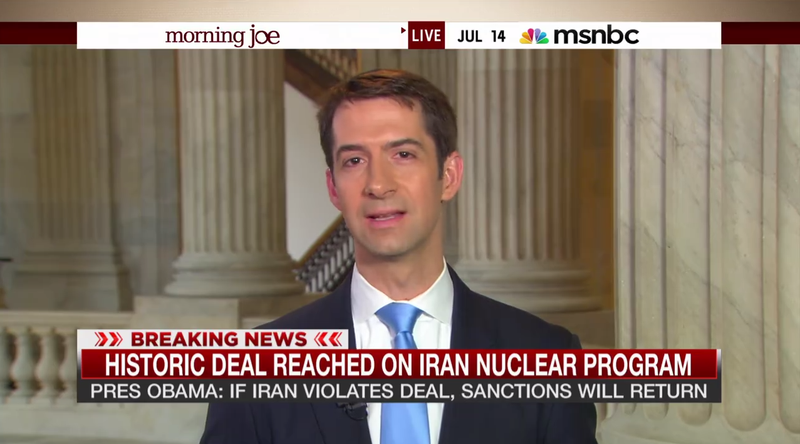U.S. Sen Tom Cotton on Tuesday called the Iran nuclear deal dangerous and said he believes Congress will act to stop it.
Appearing on MSNBC's Morning Joe program in a live interview moments after the president's speech, Cotton called it a "terrible, dangerous mistake that's going to pave the path for Iran to get a nuclear weapon."
Cotton, a staunch critic of the negotiations, said the deal would provide billions in sanctions relief and lift the arms embargo "at a time when they are destabilizing the entire Middle East."
"The American people are going to repudiate this deal, and I believe Congress will kill the deal," he said.
Fellow U.S. Sen. John Boozman also criticized the deal, saying it was "lacking any punch," while former Arkansas Gov. Mike Huckabee wrote on Twitter that the agreement "empowers an evil Iranian regime to carry out its threat to 'wipe Israel off the map.'"
"As president, I will stand with Israel and keep all options on the table, including military force, to topple the terrorist Iranian regime," wrote Huckabee, who is seeking the Republican nomination for president.
Boozman said in a statement that the president and his negotiating team had "give[n] into every demand made by the world’s largest state sponsor of terrorism."
"The President claims that this agreement is built on verification, but that appears to be exactly where this deal is lacking any punch," he said. "It was hard enough to get the international community to commit to sanctions in the first place. With a reprieve of this nature, we will never be able to reestablish them should Iran not live up to their end of this agreement, which is a strong possibility given the Iranian regime’s duplicitous actions in the past."
In his remarks, Obama warned Congress not to derail the deal, saying a lack of an agreement "means a greater chance of more war in the Middle East." Congress has 60 days to assess the accord and decide whether to pursue legislation imposing new sanctions on Iran or prevent Obama from suspending existing ones.
Asked what he thought of the inspections allowed by the deal, Cotton said it "of course" did not satisfy his concerns. He said it gives Iran time to "scrub" its nuclear sites after an inspection is sought but before one is conducted.
"If you look at the text of the deal, Iran will have weeks to delay," he said. "They'll be able to decide which sites we inspect. But more fundamentally, if they wanted to end their nuclear program and rejoin the civilized world, they could simply grant us access. They don't. They are an outlaw, terrorist-sponsoring, anti-American regime. They have the blood of hundreds of American soldiers on their hands who they killed in Iraq and Afghanistan."
Cotton knocked the deal for allowing inspections "when necessary, where necessary" rather than "anytime anywhere," which he said would be a stronger bar. The deal's terminology, he said on the show, "gives [Iran] a say where those inspectors go."
"It's easy to criticize the deal using the president's own words," Cotton said. "When we started down this path, he said the goal was to dismantle Iran's nuclear program. This leaves their nuclear program entirely intact. They can get a nuclear weapon if they violate the deal, as they have done with every agreement in the past. Or they can get a nuclear weapon if they follow the deal in a mere 10 to 15 years. The president himself has admitted that. That's why this deal is so dangerous."
Cotton later Tuesday issued a written statement, where he promised to "work tirelessly to protect America" from a deal that, if approved, would be a "historic defeat for the United States."
“When I was a platoon leader in Iraq, my soldiers and I faced deadly roadside bombs, made and supplied by Iran," wrote Cotton, who served combat tours in Iraq and Afghanistan while in the U.S. Army. "I tried to reassure them, but I could only tell them to hope it wasn’t our day to die by Iran’s roadside bombs. If Iran obtains a nuclear weapon, I fear the United States will only be able to hope it isn’t our day to die by an Iranian nuclear bomb."
Shame on the Obama admin for agreeing to a deal that empowers an evil Iranian regime to carry out its threat to "wipe Israel off the map."
— Gov. Mike Huckabee (@GovMikeHuckabee) July 14, 2015
